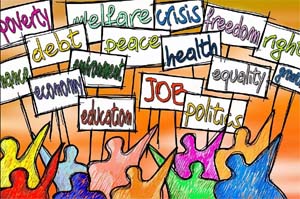Views
We have the chance to reshape the world we live in – economically, socially, and environmentally.
Gilbert F Houngbo
May 1 is widely known as International Labour Day, a day when we celebrate the contribution of workers worldwide. It is a moment for pride, celebration, and hope.
After three years of the Covid-19 crisis, followed by inflation, conflict, and food and fuel supply shocks, we badly need this. But the promises of renewal made during the pandemic, of “building back better,” have so far not been delivered for the great majority of workers worldwide.
Globally, real wages have fallen, poverty is rising, and inequality seems more entrenched than ever.
Enterprises have been hard-hit. Many could not cope with the cumulative effects of recent unexpected events. Small and micro-enterprises were particularly affected, and many have ceased operations.
People feel that the sacrifices they made to get through Covid-19 have not been recognised, let alone rewarded. Their voices are not being heard clearly enough. This, combined with a perceived lack of opportunities, has created a disturbing level of mistrust.
It doesn’t have to be like this. We are still the masters of our fate. But if we are to shape a new, more stable, and equitable world, we must choose a different path – one that prioritises social justice.
I believe this is not only doable, but essential for a sustainable and stable future. So, how do we get there?
First and foremost, our policies and actions must be human-centred, to allow people to pursue both their material well-being and their spiritual development in conditions of freedom and dignity, economic security, and equal opportunity. This approach is not new, it was set out and agreed in the aftermath of World War II, when the ILO’s international membership signed the 1944 Declaration of Philadelphia.
We need a Global Coalition for Social Justice. This coalition will create a platform to bring together a broad range of international bodies and stakeholders. It will position social justice as the keystone of the global recovery, so that it is prioritised in national, regional and global policies and actions. In sum, it will ensure that our future is human-centred.
This visionary document set out guiding principles for our economic and social systems – that they should not be turned exclusively to hitting specific growth rates or other statistical targets, but to address human needs and aspirations. This means focusing on inequality, poverty alleviation, and core social protection. The most effective way to do this is by providing quality jobs so that people can support themselves and build their own futures – “Decent Work for All,” as Sustainable Development Goal 8 terms it.
It means realistically addressing the long-term structural transformations of our time; ensuring that new technology creates and supports employment; proactively facing the challenges of climate change and ensuring we offer the jobs, skills training and transition support necessary for workers and businesses to benefit from the new low-carbon era; and treating demographic changes as a “dividend” rather than a problem, with supporting action on skills, migration and social protection, to create more cohesive and resilient societies.
We also need to reassess and refashion the architecture of our social and economic systems, so that they support this change of course towards social justice, rather than continuing to channel us into a policy “doom loop” of inequality and instability. We must reinvigorate labour institutions and organisations so that social dialogue is effective and vigorous. We must review laws and regulations affecting the world of work, so that they are relevant and up-to-date and able to protect workers and support sustainable businesses.
To make all this happen, we need to recommit to international cooperation and solidarity. We must enhance our efforts and create greater policy coherence, particularly within the multilateral system, as the United Nations Secretary-General Antonio Guterres calls it.
This is why we need a Global Coalition for Social Justice. This coalition will create a platform to bring together a broad range of international bodies and stakeholders. It will position social justice as the keystone of the global recovery, so that it is prioritised in national, regional and global policies and actions. In sum, it will ensure that our future is human-centred.
We have the chance to reshape the world we live in – economically, socially, and environmentally. Let us take this opportunity and move forward to build the equitable and resilient societies that can underpin lasting peace and social justice.
Gilbert F Houngbo is the director-general of the International Labour Organization (ILO).
– Article originally appeared on The Daily Star.



